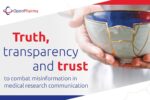This week, we look ahead to a series of 10 virtual symposia taking place in the weeks leading up to Metascience 2025 and reflect on the 2025 Annual Meeting of ISMPP. We also read about how research funding organizations in Europe are advancing open science and signpost the MHRA public consultation on draft guidance for the use of external control arms in clinical trials supporting regulatory decisions. Finally, we explore how operational data can be used to safeguard research integrity and learn about how the FOSM is pioneering new open science metrics.
To engage with:
Metascience 2025 pre-conference virtual symposia via Metascience 2025 Conference
The Metascience Conference is a global gathering for researchers, funders, policymakers and innovators involved in improving the system and practice of research. Taking place at University College London from 30 June to 2 July 2025, the conference promises to provide a forum for knowledge sharing and community building. This year, 10 pre-conference virtual symposia will be held in the 2 weeks leading up to the conference, allowing anyone to explore topics including Transparency and Openness Promotion Guidelines, the replication crisis and the use of AI to detect scientific errors. These symposia are free to attend over Zoom.
To read:
ISMPP Annual Meeting summary via The Publication Plan | 52-minute read
Taking place from 12 to 14 May in Washington, DC, the 2025 Annual Meeting of the International Society for Medical Publication Professionals (ISMPP) focused on Diversity and innovation: in concert. This series of daily summaries from The Publication Plan outlines the key takeaways from each conference session, including Verena Voelter’s (CEO and Founder of 5P Health Care Solutions) keynote titled Why does it take 5 to tango in health care?, Behind the music: a candid conversation with journal editors and publishers moderated by Kate Travis (Managing Editor at Retraction Watch) and Conor Grennan’s (Chief Artificial Intelligence Architect at NYU Stern School of Business) keynote Generative AI: how human expertise and authenticity matter more than ever.
Green open access significantly improves citation counts via arXiv | 1.5-hour read
Depositing research articles in open access repositories – commonly known as green open access –could significantly enhance their academic impact. Through their analysis of over 43 000 economics and business outputs published between 2014 and 2021, Pablo Dorta-González and Emilio Gómez-Déniz (Professors of Quantitative Methods at the University of Las Palmas de Gran Canaria) found that green open access significantly increased citation counts by 13.9% compared with closed articles. Self-archiving also reduced the likelihood of articles receiving zero citations. Hybrid, bronze and gold open access were also associated with citation advantages.
MHRA seeks feedback on guidance for RWD control arms via Gov.UK | 1-minute read
The UK Medicines and Healthcare products Regulatory Agency (MHRA) has launched a public consultation on its draft guideline for using external control arms based on real-word data (RWD) in clinical trials intended to support regulatory decisions. The guidance outlines key principles for sponsors planning to use RWD external control arms, including circumstances in which RWD external control arms are appropriate and design and analysis considerations to minimize bias. The consultation is open until 30 June 2025 and invites feedback on questions related to the clarity and completeness of the draft.
Analyse operational data to avoid “catastrophe” says publishing analyst via The Scholarly Kitchen | 8-minute read
“What is the optimal balance between operational efficiency and the safeguarding of integrity?” asks Christos Petrou (Chief Analyst at Scholarly Intelligence) in this article for The Scholarly Kitchen. Drawing from the experiences of Hindawi, PLOS One and Frontiers in Oncology, here Christos explores how operational data can reveal vulnerabilities in journal workflows and urges publishers to track and act on performance metrics to safeguard research integrity.
Advance open science practices in your organization via Katina | 10-minute read
Research funding organizations are uniquely positioned to drive systematic change in open science. In this article, Sharla Lair (Senior Strategist for Open Access and Scholarly Communication Initiatives at Lyrasis) asks James Morris and Bregt Saenen (Senior Policy Officers at Science Europe) about their survey titled Strategic approaches to and research assessment of open science, which was completed by 36 Science Europe members across 28 European countries. The results of the survey will now be used to “develop a comprehensive understanding of the systemic changes needed to advance open science”.
French Open Science Monitor pioneers new metrics via The Scholarly Kitchen | 9-minute read
The French Open Science Monitor (FOSM) is an online tool that monitors the evolution of open science in France. In this article, Todd Carpenter (Executive Director at the National Information Standards Organization) sits down with Laetitia Bracco (Head of Research Data and Bibliometrics Support Services at Université de Lorraine) and Eric Jeangirard (Data Scientist at the French Ministry of Higher Education and Research) to explore how the FOSM is identifying and categorizing data and software sharing in full-text articles to compute indicators that could ultimately steer sharing practices. Laetitia and Eric explain the challenges in accessing articles published with closed access and call on researchers and publishers to utilize persistent identifiers to make lasting connections between research outputs.
Enjoy our content? Read last week’s digest and check out our latest guest blog!
Don’t forget to follow us on Bluesky and LinkedIn for regular updates!






